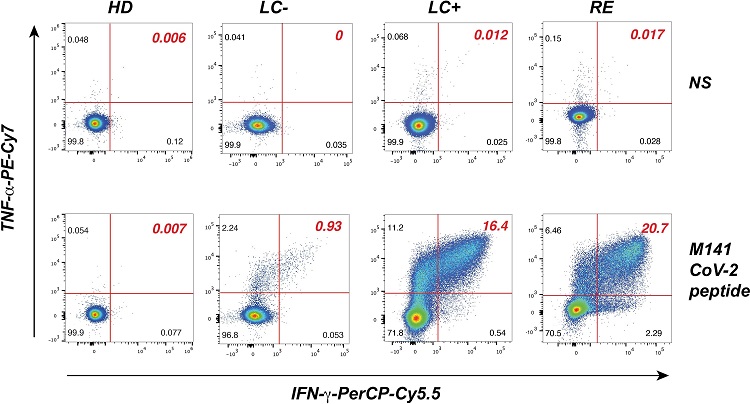French Study Discovers Two Major Types Of Antiviral Immune Responses In Long COVID
Long COVID - Two Major Types Of Antiviral Immune Responses Jul 22, 2023 1 year, 8 months, 3 weeks, 6 days, 2 hours, 10 minutes ago
Divergent Adaptive Immune Responses Define Two Types Of Long COVID
Long COVID, the persistent set of symptoms experienced by some patients following a SARS-CoV-2 infection, has remained a perplexing and poorly understood condition. Researchers from the Université de Paris Cité-France, Hôtel Dieu Hospital-France, Institut Pasteur-France, and INSERM-France have recently shed new light on this enigmatic syndrome. Their groundbreaking study has revealed the existence of two major types of antiviral immune responses in long COVID patients, offering a potential breakthrough in understanding and managing the condition.
 Analysis of SARS-CoV-2 peptide-specific CD4+ T cell responses in primary T cell lines. CD4+ T cell lines restimulated
Analysis of SARS-CoV-2 peptide-specific CD4+ T cell responses in primary T cell lines. CD4+ T cell lines restimulated
with the matrix M141 peptide (bottom row) or not restimulated (NS, top row), were fixed, permeabilized, and analyzed
by flow cytometry in the viable CD3+ CD4+ gate for the intracellular production of IFN-γ (x axis) and TNF-α (y axis).
Representative examples of responses are shown for one pre-pandemic healthy donor (HD), one seronegative
long COVID patient (LC-), one seropositive long COVID patient (LC+), and one recovered patient (RE).
The role of adaptive immune responses in
long COVID has been a subject of intense debate, with conflicting theories proposing either a weak antiviral response or an overactive immune response leading to inflammation. To resolve this uncertainty, the study team embarked on a mission to examine the humoral (antibody-based) and CD4+ T cell responses in long COVID patients who had not received the SARS-CoV-2 vaccination.
The study's subjects were divided into two groups: the first group consisted of long COVID patients who were seropositive (LC+), and the second group comprised seronegative long COVID patients (LC-). The participants were compared with COVID patients who had fully recovered (RE) and uninfected individuals serving as controls (HD).
The researchers observed that both LC+ and LC- patients displayed similar persistent symptoms, though the LC- group exhibited a trend of experiencing more symptoms than the LC+ group. Using a highly sensitive S-flow assay, the team detected low levels of SARS-CoV-2 spike-specific IgG in some LC- patients, which had been missed by conventional ELISA testing. In contrast, spike-specific IgG levels were significantly higher in the LC+ and RE groups.
Furthermore, the study employed multiplexed antibody analyses to examine responses to 30 different viral antigens. The LC- patients showed defective antibody responses to all SARS-CoV-2 proteins tested, but their responses to other viruses remained largely intact.
Additionally, a sensitive primary T cell line assay revealed that 39.1% of LC- patients exhibited low but detectable SARS-CoV-2-specific CD4 responses, while such responses were more pronounced in the LC+ and RE groups. The overall correlation between humoral and cellular responses was strong, except in the LC- group.
<
;br />
The researchers concluded that the findings provided clear evidence for two distinct antiviral immune response profiles in long COVID patients. Seropositive patients displayed coordinated and robust cellular and humoral responses comparable to those of fully recovered patients. In contrast, seronegative long COVID patients exhibited overall weak antiviral responses, with detectable specific CD4+ T cells and/or antibodies in only about half of the cases (52.2%). The emergence of divergent immune responses among patients experiencing similar persistent symptoms suggested the presence of multiple underlying causes for long COVID.
Long COVID poses a significant public health concern. The condition has affected a considerable proportion of COVID-19 patients, including those who had initially experienced mild or moderate infections. Symptoms ranged from debilitating fatigue and cognitive difficulties to autonomic dysfunction, among others. While the etiology of long COVID remains a complex puzzle, several hypotheses have been proposed, including viral persistence, autoimmune responses, and tissue damage.
The study team are the first to properly considered the role of T cell responses in long COVID. Previous studies had established the importance of T cell responses in preventing severe COVID-19, but their role in long COVID remained uncertain.
Some reports suggested dysregulated T cell functions and abnormal activation, while others found weak or undetectable T cell responses. To clarify these issues, the researchers focused on the nature of T cell responses in long COVID using a primary CD4+ T cell line approach.
By recruiting long COVID patients from an observational cohort before vaccination, the researchers were able to study their endogenous immune responses unaffected by exogenous vaccine-induced immunity. They discovered that a significant proportion of long COVID patients in their cohort were seronegative, highlighting the importance of studying this group alongside seropositive patients.
The findings from this study have significant implications for understanding the pathogenesis of long COVID and developing tailored interventions. Identifying two distinct immune response profiles suggests that different mechanisms may underlie the persistence of symptoms in these patients. The study's authors emphasized the importance of using highly sensitive immunological assays to detect signs of previous SARS-CoV-2 infections in seronegative individuals, as they represent a considerable proportion of long COVID cases and may face challenges in accessing appropriate medical care.
In conclusion, this French study provides valuable insights into the diverse immunological landscape of long COVID. The discovery of two major types of antiviral immune responses among patients experiencing similar symptoms opens up new avenues for research and potential therapeutic strategies to address this complex and debilitating condition.
The study findings were published in the peer reviewed journal: Frontier In Immunology.
https://www.frontiersin.org/articles/10.3389/fimmu.2023.1221961/full
For the latest on
Long COVID, keep on logging to Thailand Medical News.
